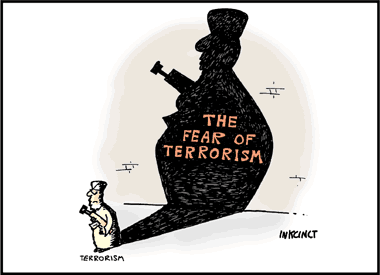
Theresa May’s “enough is enough” declaration was splashed across the front pages of the British dailies after the latest shocking terrorist attack. “Enough is enough” is a sentiment that resonates with the public, but many Britons are concerned about the new counter-terrorism measures the British PM is proposing.
Theresa May seems more interested on criminalising “extremist” ideas than improving community policing (as Labour leader Jeremy Corbyn has proposed).
The Guardian newspaper accused her
of wanting to “police thoughts rather than acts” and said she was promoting “a form of thoughtcrime.”
There is a fundamental democratic principle that people should be allowed to hold whatever political views they like, however “extreme”, as long as they don’t resort to violence.
The Guardian explained that “Mrs May’s policies exclude cooperation with the very people who might be best placed as discouragers of terrorism: those who hold similar ‘extremist’ beliefs but who are non-violent and opposed to the methods of violence. Mrs May plans to criminalise the eyes and ears you need to spot terror.”
Introducing more repressive measures and weakening democracy is not the way to combat terrorist acts.
Commonly terrorist acts are motivated (but not justified) by a feeling that Moslems are suffering discrimination in Western countries.
Prejudicial measures like Donald Trump’s travel restrictions on people flying in to America from certain Islamic countries are not helping.
New Zealand has the opportunity to tell the visiting US Secretary of State Rex Tillerson to his face that such bans are bigoted, anti-Islamic, anti-democratic and counter-productive.
It would be good if Bill English also told Tillerson that he has turned down the US request to increase its military involvement in Afghanistan. The chaos produced by the American wars in Afghanistan and various Middle Eastern nations has provided fertile ground for terrorist recruitment, resulting in many atrocious acts of the kind we saw in London last Friday.